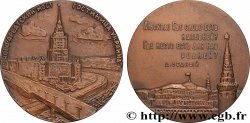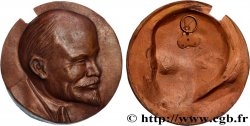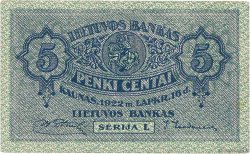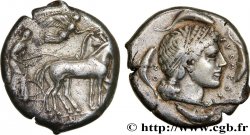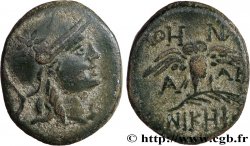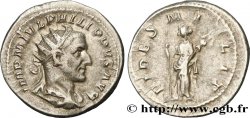fme_976592 - RUSSIA - SOVIET UNION Fonte, Lénine
Not available.
Item sold on our e-shop (2025)
Price : 220.00 €
Item sold on our e-shop (2025)
Price : 220.00 €
Type : Fonte, Lénine
Date: n.d.
Metal : bronze
Diameter : 216 mm
Orientation dies : 12 h.
Weight : 1180,72 g.
Edge : lisse
Puncheon : sans poinçon
Coments on the condition:
Patine hétérogène avec des taches d’oxydation. Faible usure. Quelques concrétions
Obverse
Obverse legend : LENINE - 1921.
Obverse description : Buste de Lénine de face, signé : B.
Reverse
Reverse legend : INCUS.
Commentary
Vladimir Ilitch Oulianov (en russe : Влади́мир Ильи́ч Улья́нов Prononciation), dit Lénine (Ленин) (1870-1924) est un révolutionnaire, théoricien politique et homme d'État russe. Rejoignant à la fin du XIXe siècle le Parti ouvrier social-démocrate de Russie, la section russe de la Deuxième Internationale, il provoque en 1903 une scission du Parti russe et devient l'un des principaux dirigeants du courant bolchevik. Auteur d'une importante œuvre écrite d'inspiration marxiste, il se distingue par ses conceptions politiques qui font du parti l'élément moteur de la lutte des classes et de la dictature du prolétariat.
Vladimir Ilyich Ulyanov (Russian: Влади́мир Ильи́ч Улья́нов), known as Lenin (Ленин) (1870-1924) was a Russian revolutionary, political theorist and statesman. Joining the Russian Social Democratic Labour Party, the Russian section of the Second International, at the end of the 19th century, he provoked a split in the Russian Party in 1903 and became one of the main leaders of the Bolshevik movement. The author of a significant body of written work inspired by Marxism, he distinguished himself by his political conceptions which made the party the driving force of the class struggle and the dictatorship of the proletariat.
Vladimir Ilyich Ulyanov (Russian: Влади́мир Ильи́ч Улья́нов), known as Lenin (Ленин) (1870-1924) was a Russian revolutionary, political theorist and statesman. Joining the Russian Social Democratic Labour Party, the Russian section of the Second International, at the end of the 19th century, he provoked a split in the Russian Party in 1903 and became one of the main leaders of the Bolshevik movement. The author of a significant body of written work inspired by Marxism, he distinguished himself by his political conceptions which made the party the driving force of the class struggle and the dictatorship of the proletariat.








 Report a mistake
Report a mistake Print the page
Print the page Share my selection
Share my selection Ask a question
Ask a question Consign / sell
Consign / sell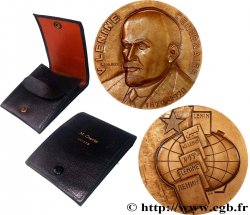
 Full data
Full data


